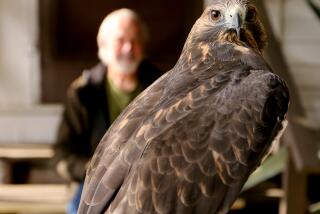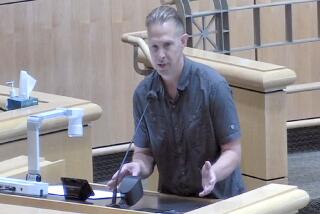Rep. With Wind Farm Ties Denies Power Play
- Share via
Aides to California Rep. Richard W. Pombo pressed officials of the U.S. Department of the Interior last year to suspend environmental guidelines opposed by the wind-power industry without disclosing that Pombo’s family had a substantial financial stake in wind energy.
The guidelines, issued in 2003, seek to reduce the number of birds killed by the spinning blades of wind turbines, such as those that flank the Altamont Pass east of Oakland.
Pombo (R-Tracy), heads the House committee that oversees the Interior Department. His parents own a 300-acre ranch in the Altamont Pass and have received hundreds of thousands of dollars in royalties from wind-power turbines on their land over the last 17 years -- much more than the family gets from cattle on that land.
“I signed a confidentiality agreement so I can’t tell you exactly” how much, said Ralph Pombo, the congressman’s father, “but there is no comparison. I get a lot more from wind.”
In an interview with The Times, Rep. Pombo strongly denied any conflict of interest.
According to price and production records obtained by The Times, his parents’ royalties for the most recent year available, 2001, topped $125,000. That was at the peak of the California energy crisis when prices were unusually high.
The Pombo ranch is in the 73-square-mile Altamont Pass Wind Resource Area, which is on a major migratory bird route. Each year, several hundred raptors are killed there, including 40 to 60 golden eagles, leading the U.S. Fish and Wildlife Service to declare it a problem area.
Last October, Pombo’s aides wrote to Interior Secretary Gale A. Norton asking her to suspend the guidelines. A few days later on Oct. 8, staff members of the House Resources Committee, which Pombo heads, confronted Fish and Wildlife Service officials about the guidelines and regulatory actions taken by the agency’s Sacramento field office at Altamont. In both cases, they did not mention the Pombo family holdings.
Pombo told The Times he was unaware of the letter to Norton when it went out under his signature.
He said that his parents’ holdings, in which he said he has no direct stake, were never a consideration in his official dealings with wind power.
Pombo’s committee staff members say they now wish they had disclosed the congressman’s family interest to Norton.
House ethics rules do not require that a member report financial interests of parents.
Pombo, 43, the only current member of Congress who wears a cowboy hat in his official photograph, often targets the Fish and Wildlife Service in writings and speeches. He is a leader in efforts to overhaul the Endangered Species Act, which he and other critics believe has imposed an unjustifiable financial burden on ranchers and other landowners.
The federal wind-power guidelines, targeted by Pombo’s office, mainly concern environmental protections to be used when new wind-power facilities are being built or when older turbines are replaced with newer models.
The federal government considers the guidelines voluntary. But many state and local authorities routinely follow them when they consider issuing building and land-use permits for wind projects.
When Pombo’s aides intervened in the wind-power issue, local permits to operate the Altamont turbines, including the permit covering the Pombo ranch, were before the Alameda County Board of Supervisors.
Environmental groups challenging the permits want the county to shut down some of the 5,000 turbines at Altamont during the fall migratory season and to gradually replace aging turbines with new models that kill fewer birds. Both actions ultimately could reduce income to Altamont landowners, including the Pombos.
Until the Oct. 8 meeting in Washington, D.C., Fish and Wildlife Service biologists played a key role advising the county, industry and environmental groups.
The meeting was sparked by complaints to Pombo’s office by Altamont turbine operator Rick Koebbe, president of PowerWorks Inc. Koebbe had been sending messages to Pombo’s office for months about what he felt were “overaggressive” and “unsupervised” Fish and Wildlife Service regulators at Altamont.
In addition to providing advice to state and local officials, federal wildlife agents and biologists had been documenting bird deaths at Altamont for possible prosecution under the federal Migratory Bird Treaty Act, which makes killing golden eagles and other rare species a crime.
According to records of the meeting obtained by The Times, several Resources Committee staff members and a member of Pombo’s personal staff repeatedly questioned Fish and Wildlife Service officials about the actions of federal agents at Altamont. They also grilled the officials about the agency’s position on proposals from the California Energy Commission to reduce bird kills at the Altamont Pass Wind Resources Area.
Matthew Huggler, the Fish and Wildlife Service’s legislative liaison, described the meeting as “fairly intense.” The main focus of the committee staff “was on industry concerns, specifically that the industry has not had adequate input into the state Energy Commission report or the service’s interim guidance on wind farms,” he said.
The same afternoon, a supervisor in the Fish and Wildlife Service’s Sacramento office ordered agency biologists to halt public participation in the Altamont permitting process.
“Effective immediately,” Field Supervisor Wayne White instructed the biologists, “no one from this office will meet with anyone or discuss over the phone our biological views of issues associated with the Altamont wind farm.”
Two months after the meeting, agency biologists were once again allowed to interact with industry and state officials in the permitting process. That happened only after a wind-industry group and local officials formally requested their participation.
But Richard Wiebe, San Francisco attorney for the Center for Biological Diversity, one of the groups challenging the Altamont wind permits, said federal wildlife service involvement has not been the same since the October meeting with Pombo’s staff.
“At the very least, it has poured a big tub of molasses into the decision-making process,” Wiebe said.
“From our point of view, the service’s non-participation has continued to grow. Before October, they were very engaged, and the industry perceived them as engaged. I think this episode has really taken the service out of the picture at Altamont.”
In November, Wiebe filed a lawsuit in state court on behalf of the environmental group, seeking restitution from windmill operators for the birds it said have been killed by the turbines at Altamont.
On March 17, more than five months after receiving Pombo’s letter, the Interior Department formally rejected Pombo’s request that the national guidelines covering wind power be “immediately” suspended.
Assistant Secretary Craig Manson defended the guidelines, saying that wind-industry representatives had been consulted repeatedly.
“If you are aware of any specific agencies utilizing this guidance inappropriately, please let us know and we would be happy to contact them,” Manson wrote to Pombo.
Although Pombo has a partnership with his father and two brothers in another ranching operation, he receives no income from the wind turbines in Altamont Pass, he said, adding that he knew nothing about the details of the royalties. He said he was not aware that his parents’ permit was one of those currently under appeal to the Alameda County Board of Supervisors.
Asked if he felt any obligation to disclose his family’s income when dealing with wind-power issues on the Resources Committee, Pombo answered: “Disclose what? That somebody in my family makes money? When it comes to winding, gee, I’ve been an advocate of winding since I saw what it could produce in my district in our area.”
Pombo also said he never met or talked with Koebbe, the Altamont wind-power operator whose complaints prompted the Oct. 8 meeting.
“I don’t believe I ever had a conversation with the man,” Pombo said.
Although Pombo’s Oct. 4 letter to Norton dealt with issues central to the wind-energy regulation, the congressman insisted he never saw the letter to Norton.
In interviews, members of Pombo’s committee staff said that they composed the letter, signed it with Pombo’s name and sent it out without consulting the congressman.
Pombo said: “I hate to admit it, but I didn’t even see the letter until after all this.
“If I had sat down and wrote that letter myself, I may have worded it a little bit differently than what they did, but I don’t have anything in there that is out of line,” Pombo added. “The committee has very large jurisdiction, and we move more legislation than any committee in Congress. There’s a lot of deals that I have to get involved with and this just wasn’t one of them.”
But Pombo also defended the contents of the letter, saying it reflected his beliefs, based on his long identification with the private property rights movement, that government wildlife agents too often intrude on the rights of landowners and businesses.
Before he was elected to Congress, Pombo said, he worked almost every day at the Altamont ranch and never saw a dead eagle or other protected bird. He described Fish and Wildlife Service reports of bird kills in the Altamont wind turbines as “exaggerated.”
But Pombo said he never sought to bar the agency from the Altamont area. “I think Fish and Wildlife needs to go in there and really look at what the problem is,” Pombo said. “I’m not sure that’s ever actually happened.”
Times staff writer Tom Hamburger contributed to this report.
More to Read
Sign up for Essential California
The most important California stories and recommendations in your inbox every morning.
You may occasionally receive promotional content from the Los Angeles Times.










